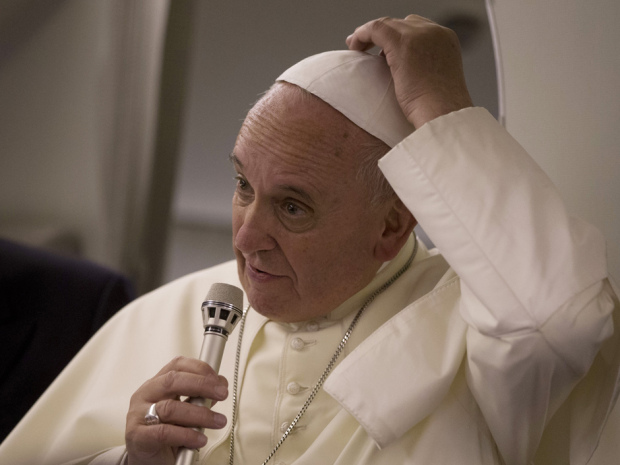
Does Pope Francis believe the Social Kingship of Christ is a form of colonialism? Apparently, he does. In that wide ranging May 9th interview with the French paper La Croix, the Holy Father said the following:
We must talk about the roots in plural because there are so many of them. When I hear about the Christian roots of Europe, I sometimes fear the tone, which can be triumphalist or vengeful. This then becomes colonialism.
Europe, yes, has Christian roots, but in a spirit of service and washing of feet. The duty of Christianity for Europe is the service. And not colonization.
Has there ever been a Pontiff who so despised not only the un-changeable Catholic doctrine that Christ is King of all the Universe but also the Divine Mandate to go forth and teach all nations the Catholic faith?
In that same interview, the Bishop of Rome added this little nugget:
Confessional states end badly…I believe that secularism accompanied by a strong law which guarantees religious freedom provides a framework for moving forward
Has the Holy Father ever read the Syllabus of Errors?
55. The Church ought to be separated from the State, and the State from the Church – CONDEMNED
Or Pope St. Pius X’s Vehementer Nos?
That the State must be separated from the Church is a thesis absolutely false, a most pernicious error
To substantiate his opposition to “Confessional states,” Pope Francis is relying on the same un-founded claims made by neo-Americanists like John Courtney Murray at the Second Vatican Council. The argument is essentially this:
The Church, for 16 centuries, forgot the true meaning of “Render unto Caesar that which is Caesar’s and unto God that which is God’s.” Filled with earthly aspirations, Pope after Pope got mixed up in politics and corrupted everything. In our time, we must simply ask for the freedom to operate. We must not wish to impose our values on governments across the world.
The core idea behind this naive theory is that of Integral Humanism – the belief that a society infused by a wide assortment of Christian, Jewish, Muslim and all sorts of “religious” values is all that is needed for a country to flourish.
How wrong this view was. And is. The aggressive state secularism we experience in much of the West today is due to the fact that the Church went silent on the Social Kingship of Christ and turned over the public square to men who had no understanding (hatred?) of original sin, spiritual warfare and sanctifying grace. The entire idea of “Integral Humanism” is a fiction. History has proven that a state always has an established religion. Today, that religion is secular humanism (i.e. Liberalism). Pope Francis is living in the past. It is secular states that end badly.
If you’re in the mood for hearing some thoughts on political philosophy, you’re in luck. Patrick Deneen, a professor at Notre Dame, was recently interviewed about the nature of Liberalism. It’s about twenty minutes long. Listen if you have the time. Deneen, whether he wants to be or not, is probably most well known to ordinary Catholics for his article “A Catholic Showdown Worth Watching” for The American Conservative. Read it. It sparked a necessary public debate back in February of 2014 over Liberalism and Catholicism that has continued to the present day.
Bp. Bernard Fellay’s full interview with Edward Pentin of National Catholic Register has been released. It’s long but well worth watching. I was pleased with much of it, as it seems the questions I suggested the SSPX be thinking about as “regularization” looms were addressed by the Bishop.
Here is the first segment of the interview. The other two can be seen here
Pentin’s written summary of the interview can be found on National Catholic Register here. What I found most interesting in Pentin’s article is the following:
A personal prelature similar to that of Opus Dei is the most likely canonical structure, and, already, with regards to the sensitive issue of episcopal appointments, the SSPX has agreed to the Pope choosing a candidate from a list of three proposed by the society.
In an interview with Zenit in February, Archbishop Guido Pozzo, secretary of the Pontifical Commission Ecclesia Dei, which is charged with bringing regularizing the SSPX, said the Holy See wants “clarification” on the society’s criticisms of the Council, but these can also take place “even after full reconciliation.” He said the SSPX must also move away from “polemical and antagonistic confrontation.” A Vatican source said the society has already “toned down some of their literature, interviews and publications.”
If Bp. Fellay ever wants to come on Church & State or MagnificatMedia.com, he is more than welcome to appear via Skype whenever his schedule allows him. Consider this an open invitation, Your Excellency. Of course, if the Society wants to fly me out to Menzingen for a sit down interview, that would be quite alright with me.
Lastly, does anyone else out there think that Mr. Pentin would, if the SSPX is “regularized,” take a PR position within the Society? He seems to be the sort of person they’d be interested in having around as that process unfolds. Just a thought.
